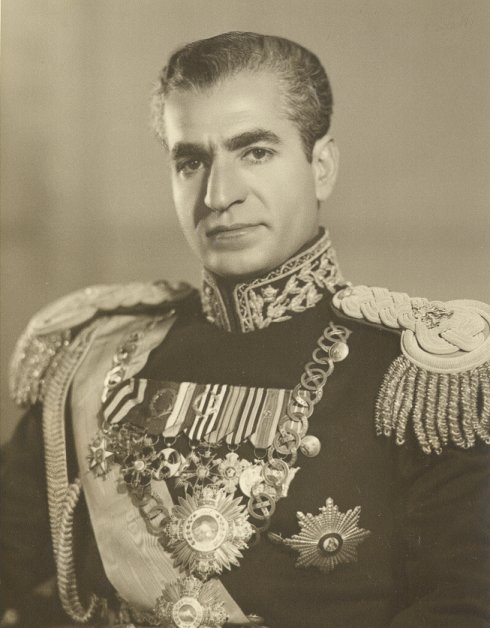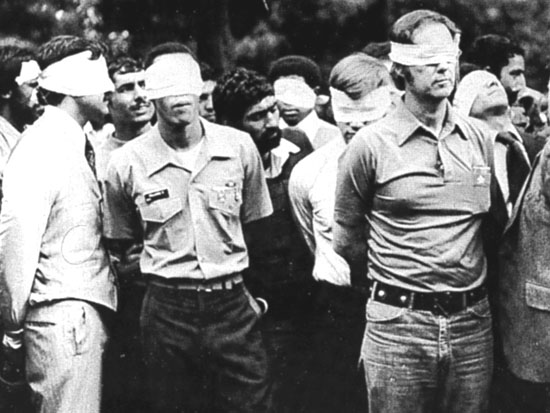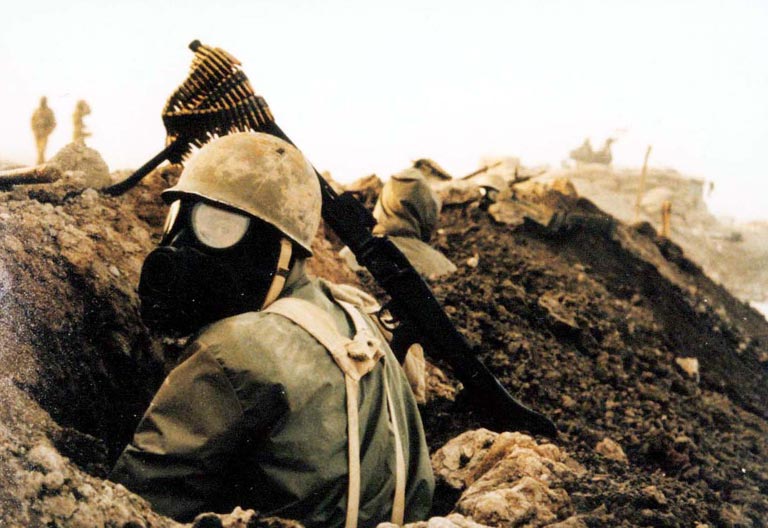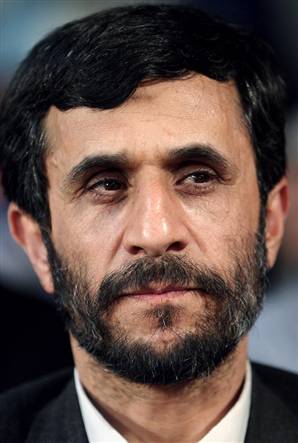theignoramus
Member
Placing sanctions on Iran`s central bank is an extremely hostile act, arguably an act of war. Many ordinary Iranians will suffer and it`s unlikely the regime will change its behaviour. (see North Korea, Saddam era Iraq)
Should the Obama admin enact this legislation, some form of military confrontation with Iran isnt a matter of if, it`s a matter of when. (again, see Saddam era Iraq)
Below is an aggregate of useful information and key highlights of the timeline in Iran`s relations with the US.
http://www.piie.com/realtime/?p=2560
http://www.huffingtonpost.com/jayshree-bajoria/iran-central-bank_b_1133836.html
A useful timeline of events leading up to current tensions with Iran
http://www.cbc.ca/news/world/story/2011/12/02/f-iran-timeline.html
Some key moments:




April 7, 1980 — The U.S. cuts all diplomatic ties with Iran.


***




MUST SEE DOCUMENTARY ON THE GOVERNMENT CRACKDOWN AGAINST THE GREEN MOVEMENT:
LETTERS FROM IRAN
Should the Obama admin enact this legislation, some form of military confrontation with Iran isnt a matter of if, it`s a matter of when. (again, see Saddam era Iraq)
Below is an aggregate of useful information and key highlights of the timeline in Iran`s relations with the US.
http://www.piie.com/realtime/?p=2560
Financial sanctions, including several directed at leading Iranian banks, have been applied and tightened over the years by the United States Treasury, working with European and other allies. Now the Senate has unanimously approved a bill calling on the President to impose stiff new financial sanctions directed at the Central Bank of Iran (CBI). The Obama administration opposed the measure, however, arguing that it would be counterproductive and alienate key allies who have been cooperating in the campaign to isolate Tehran.
The financial sanctions already in place and approved by the United Nations target Iranian banks that facilitate payments for nuclear technology and hardware. These sanctions can probably be credited with impeding Iran’s weapons quest. In fact, according to our scorecard which covers more than 200 sanctions episodes over the past century, financial sanctions have a better chance of securing compliance by the target country than export or import restrictions. We rate them at least partly successful in 36 percent of cases, whereas the success rate for trade sanctions is only 25 percent.
In past episodes, however, the objective of financial sanctions was to deny the target country concessional assistance from abroad—usually bilateral aid or World Bank money. In the Iranian case, the Senate’s objective is to interrupt commercial payments for Iran’s oil exports. Put another way, the proposed sanctions on the CBI—which handles almost all Iranian receipts for oil sales but has not been implicated in financing nuclear weaponry—would be an indirect way of hampering Iranian exports of petroleum, which account for 85 percent of its foreign exchange. Some Congressmen are also advocating a ban on certification of Iranian ships and oil rigs, as an additional means of hampering Iranian oil exports.
The Obama Administration, seeking to control the extent and pace of sanctions, argues that the Senate measure could spike the price of oil and fracture the US-led coalition that has so far been willing to pressure Iran using other measures. (The Administration has not yet commented on the certification ban.) Broad sanctions against the Central Bank of Iran are not likely to gain the approval of the UN Security Council. Unspoken, but in everyone’s mind, is the high probability that Pakistan, India, and China, along with several smaller importers, would ignore CBI sanctions imposed by the United States and European powers.
Nevertheless, even without others going along, CBI sanctions imposed by the United States alone would disrupt Iran’s economy for the months required to re-route petroleum shipments from current destinations to an array of new markets, centered in Asia.
A recent report from the International Atomic Energy Agency on Iran's nuclear program has prompted fresh sanctions from Western states. The United States designated Iran's entire financial sector as a "primary money laundering concern" in November, but does not mandate sanctions against the central bank. The Obama administration fears such a measure will alienate allies and cause oil prices to rise, providing Tehran with a windfall. But the Senate unanimously voted on December 1 to sanction the bank and foreign financial institutions that do business with it.
With concern mounting about Iran's nuclear program--despite Iran's insistence that it is a peaceful one--Washington is looking for ways to deter it from making a nuclear bomb. A number of analysts believe sanctioning the central bank is "the most powerful weapon in the U.S. economic arsenal" .
Iran is the world's third largest exporter of crude oil; its oil exports make up 80 percent of its total exports and account for half of government revenues. With most of this revenue being funneled through the central bank, sanctioning it could devastate the country's economy.
But such a move could shrink global oil supply and push up prices. By preventing countries from doing business with Iran's central bank, the main conduit for receipts of oil sales, it would limit Iran's oil exports. Tehran warned that any effort to block its oil exports would more than double crude prices to above $250 a barrel. Plus, U.S. officials say it is unclear whether these sanctions would affect Iran's exports to China, its biggest buyer of oil. David Cohen, the Treasury Department's undersecretary for terrorism and financial intelligence, told the Senate Foreign Relations Committee last week that "it is quite possible that the Chinese, if this amendment were adopted, would take the risk essentially that we would cut off their financial institutions from the United States but I am just not in a position to predict exactly how the Chinese would react."
There is also little consensus among experts on the efficacy of sanctions. An August 2011 IMF report cast doubts on whether sanctions are harming the economy, noting growth rates spurred by high oil prices and economic reforms. Even experts who believe sanctions have taken a toll on Iran's economy, like Suzanne Maloney of the Brookings Institution , say they have failed to influence regime behavior on the nuclear program.
http://www.huffingtonpost.com/jayshree-bajoria/iran-central-bank_b_1133836.html
A useful timeline of events leading up to current tensions with Iran
http://www.cbc.ca/news/world/story/2011/12/02/f-iran-timeline.html
Some key moments:
1951 — Prime Minister Muhammad Mossadegh oversees the nationalization of the oil industry, dominated by the Anglo-Iranian Oil Company. Britain responds by imposing a trade embargo on Iran.

1953 — After a failed attempt to dismiss Prime Minister Muhammad Mossadegh, the shah flees to Rome. A few days later, the U.S. and U.K. orchestrate a coup that ousts Mossadegh and installs the shah as the new leader, hoping he'll serve as a bulwark against Soviet influence in the Middle East

Jan. 1963 — The shah launches a series of economic, land and social reforms aimed at Westernizing the country and known as the White Revolution. Those who oppose the reforms are ruthlessly silenced with the aid of the shah's secret police force, SAVAK.
June 1963 — Ruhollah Khomeini, a Shia scholar and vocal critic of the Western-backed regime of the shah, is arrested after making a speech denouncing the shah and U.S. influence in Iran.

Nov. 1964 — Khomeini is sent into exile, from where he continues to denounce the shah through writings and lectures.
Sept. 1978 — The shah imposes martial law in the face of growing demonstrations and strikes opposing his authoritarian rule.
Jan. 16, 1979 — With opposition getting fiercer, the shah and his wife flee to Egypt.
Feb. 1979 – Exiled Islamic religious leader Ayatollah Ruhollah Khomeini returns to Iran and assumes control of the country.
April 1, 1979 — The new Islamic Republic is declared after a national referendum on whether or not to make Iran an Islamic republic. A committee of experts is convened to draft the new constitution, and it is this committee, made up in large part of Shia clerics and members of the Islamic Republican Party, that establishes the cleric-dominated system of rule and declares Khomeini the first supreme leader of the new theocratic republic.
Nov. 4 1979 —Islamic revolutionaries take more than 60 Americans hostage at the U.S. embassy in Tehran, demanding the extradition of the shah, who was in the U.S. undergoing cancer treatment, to Iran to stand trial. Some hostages are released but 52 remain held for 444 days.

April 7, 1980 — The U.S. cuts all diplomatic ties with Iran.
April 25, 1980 — A secret attempt to free the U.S. embassy hostages fails spectacularly. Two of the American helicopters charged with carrying out the rescue run into engine trouble and a third is damaged during a landing. The mission is aborted, but while departing two helicopters crash, killing eight U.S. soldiers. The incident is a major blow for the administration of U.S. President Jimmy Carter, who suffers a massive defeat in the presidential election a few months later.

1980-88 — Iran-Iraq war. In September 1980, Iraqi forces invaded Iran, whose new post-revolution Islamist government was seen as a threat by Iraq's president, Saddam Hussein. The invasion set off a brutal eight-year-long conflict that devastated both countries and ultimately ended in a draw. Hundreds of thousands of people died — possibly as many as 1.5 million. The U.S. under the Reagan administration sided with Iraq in the conflict, sharing intelligence and providing food credits and funds.***

***
Sunday said:THE US and Britain sold Saddam Hussein the technology and materials Iraq needed to develop nuclear, chemical and biological weapons of mass destruction.
Reports by the US Senate's committee on banking, housing and urban affairs -- which oversees American exports policy -- reveal that the US, under the successive administrations of Ronald Reagan and George Bush Sr, sold materials including anthrax, VX nerve gas, West Nile fever germs and botulism to Iraq right up until March 1992, as well as germs similar to tuberculosis and pneumonia. Other bacteria sold included brucella melitensis, which damages major organs, and clostridium perfringens, which causes gas gangrene.
Classified US Defense Department documents also seen by the Sunday Herald show that Britain sold Iraq the drug pralidoxine, an antidote to nerve gas, in March 1992, after the end of the Gulf war. Pralidoxine can be reverse engineered to create nerve gas.
The Senate committee's reports on 'US Chemical and Biological Warfare-Related Dual-Use Exports to Iraq', undertaken in 1992 in the wake of the Gulf war, give the date and destination of all US exports. The reports show, for example, that on May 2, 1986, two batches of bacillus anthracis -- the micro-organism that causes anthrax -- were shipped to the Iraqi Ministry of Higher Education, along with two batches of the bacterium clostridium botulinum, the agent that causes deadly botulism poisoning.
One batch each of salmonella and E coli were shipped to the Iraqi State Company for Drug Industries on August 31, 1987. Other shipments went from the US to the Iraq Atomic Energy Commission on July 11, 1988; the Department of Biology at the University of Basrah in November 1989; the Department of Microbiology at Baghdad University in June 1985; the Ministry of Health in April 1985 and Officers' City, a military complex in Baghdad, in March and April 1986.
The shipments to Iraq went on even after Saddam Hussein ordered the gassing of the Kurdish town of Halabja, in which at least 5000 men, women and children died. The atrocity, which shocked the world, took place in March 1988, but a month later the components and materials of weapons of mass destruction were continuing to arrive in Baghdad from the US.
The Senate report also makes clear that: 'The United States provided the government of Iraq with 'dual use' licensed materials which assisted in the development of Iraqi chemical, biological and missile-system programs.'
This assistance, according to the report, included 'chemical warfare-agent precursors, chemical warfare-agent production facility plans and technical drawings, chemical warfare filling equipment, biological warfare-related materials, missile fabrication equipment and missile system guidance equipment'.
Jan. 20, 1981 — The 52 remaining U.S. embassy hostages are released on the day of U.S. President Ronald Reagan's inauguration.
October, 1983. The Reagan Administration begins secretly allowing Jordan, Saudi Arabia, Kuwait, and Egypt to transfer United States weapons, including Howitzers, Huey helicopters, and bombs to Iraq. These shipments violated the Arms Export Control Act.
(Bush's Secret Mission. The New Yorker Magazine. November 2, 1992)
November 1983. George Schultz, the Secretary of State, is given intelligence reports showing that Iraqi troops are daily using chemical weapons against the Iranians.
(Washingtonpost.com. December 30, 2002)
December 20, 1983. Donald Rumsfeld , then a civilian and now Defense Secretary, meets with Saddam Hussein to assure him of US friendship and materials support.
January 14, 1984. State Department memo acknowledges United States shipment of "dual-use" export hardware and technology. Dual use items are civilian items such as heavy trucks, armored ambulances and communications gear as well as industrial technology that can have a military application.
1985 — In what became known as the Iran-Contra Affair, the U.S. made a deal to secretly sell weapons to Iran in exchange for the release of hostages being held by the Iranian-backed group Hezbollah in Lebanon. Iran needed the weapons to fund its war with Iraq, and the U.S., which was officially forbidden from selling arms to Iran, diverted part of the secret funds to CIA-backed guerillas in Nicaragua known as the Contras, who were trying to overthrow the leftist Sandinista regime. In the end only three U.S. hostages of several dozen were released — and three more were taken not long after.
March, 1986. The United States with Great Britain block all Security Council resolutions condemning Iraq's use of chemical weapons, and on March 21 the US becomes the only country refusing to sign a Security Council statement condemning Iraq's use of these weapons.
1987 — British chargé d'affaires Edward Chaplin is kidnapped in Tehran by revolutionary guards and held for 24 hours over Britain's perceived support of Iraq. The UK withdraws all staff.
July 1988 — A U.S. warship patrolling the Persian Gulf mistakes an Iranian passenger jet for an F-14 fighter and shoots it down, killing 290 passengers and crew. Iran vows to "avenge the blood of our martyrs."
July 1988 — Iran and Iraq sign a UN-brokered ceasefire agreement, ending eight years of war.
June 3, 1989 — Ayatollah Khomeini dies and is replaced by then president Ali Khamenei.
May 1995 — U.S. adopts sanctions banning trade with and investment in Iran, in response to the ramping up of Iran's nuclear program and its support of organizations the U.S. considers terrorist entities such as Hezbollah and Hamas.

May 1997 — Mohammad Khatami, a moderate cleric and former cultural minister, is elected president on a reformist platform in a surprising upset. Despite energizing a large portion of the youth vote, Khatami was not able to push through his reform agenda during his two terms in office and was largely seen as an ineffective president.

Feb. 2000 — Reformers make sweeping gains in the parliamentary elections, winning 170 of 290 seats. It is the first time since 1979 that the hardliners lose control of the legislature.
Jan. 2002 — U.S. President George W. Bush refers to Iran as one of three countries, along with Iraq and North Korea, that constitute an "axis of evil arming to threaten the peace of the world" in his first state of the union message.
Nov. 2003 — Iran agrees to suspends it uranium enrichment program and allow tougher UN inspections of its nuclear facilities.
Nov. 2004 — Conservatives win Iran's parliamentary elections, rolling back gains made by reformers just four years earlier.
Nov. 2004 — In an effort to avoid possible UN sanctions, Iran agrees to suspend its uranium enrichment activities after talks with ambassadors from Germany, Britain and France.
June 2005 — Mahmoud Ahmadinejad, the hardline major of Tehran, wins presidential elections, dealing a blow to the reformers who had gained some ground in the last election.

Sept. 2005 — The IAEA finds Iran had not taken adequate measures with regard to the safeguarding, processing and use of nuclear material and was in violation of the Non-Proliferation Treaty.
Dec. 2006 — The UN Security Council votes to adopt sanctions on sales of nuclear materials and technology to Iran.
March 2007 — Fifteen British sailors and marines are held for 13 days after being captured by Iranian authorities in the Shatt al-Arab river between Iraq and Iran.
May 2009 — A U.S. State Department report dubs Iran the "most active state sponsor of terrorism."
June 2009 — Mahmoud Ahmadinejad defeats popular opposition leader Mir Hossein Mousavi in a disputed presidential election. Massive protests erupt questioning the legitimacy of the election results. The regime's crackdown against the protests, considered to be the biggest show of opposition in 30 years and dubbed the Green Movement, attracts international attention after the death of a female protester named Neda Agha-Soltan is captured on video and posted on YouTube. Between 30 and 80 protesters are believed to have been killed and more than 1,000 wounded.

MUST SEE DOCUMENTARY ON THE GOVERNMENT CRACKDOWN AGAINST THE GREEN MOVEMENT:
LETTERS FROM IRAN
Nov. 2009 — The IAEA passes a resolution condemning Iran for not revealing sooner that it was building a second nuclear enrichment site, located near the city of Qom. Its main enrichment site is at Natanz. The agency says the fact it had lied about the Qom site, which the IAEA said was begun as early as 2002, indicates Iran may be hiding other enrichment facilities.
Jan. 2010 — Nuclear physicist Masoud Ali-Mohammadi is assassinated in Tehran. Iran blames the bomb attack on foreign agents wanting to undermine Iran's nuclear program. Members of the Iranian opposition say it was meant as a warning to those who, like Ali-Mohammadi, had campaigned for opposition candidate Mir Hossein Mousavi in the last election.
May 2010 — Iran makes a deal, brokered by Brazil and Turkey, to send some of its low-enriched uranium to Turkey in exchange for fuel for its research reactor. The move falls short of satisfying Western powers, since Iran says it won't prevent it from continuing its own enrichment program.
June 2010 — The UN Security Council imposes its fourth round of sanctions on Iran since 2006 after the IAEA releases a report that says Iran has enough nuclear material to build two weapons. Brazil and Turkey vote against the resolution; Lebanon abstains.
Sept. 2010 — A destructive computer worm known as Stuxnet disables several centrifuges at the Natanz uranium-enrichment plant in Iran. The complexity of the cyberattack suggests it was orchestrated by at least one nation state and several experts believe it was a joint action by Israel and the U.S. intended to hobble Iran's nuclear program.
Sept. 2011 —Iran announces that its Russian-built Bushehr nuclear plant has been connected to the national power grid after decades of delay. Construction on Bushehr, billed as the Middle East's first commercial nuclear plant, had first begun under the shah in 1975, but the project was stalled by the revolution, the Iran-Iraq war and opposition from the West.
Oct. 2011 — Two Iranians are charged in U.S. federal court with plotting to assassinate the Saudi ambassador to the U.S. One of the men is reportedly a member of the Quds Force, an offshoot of the Revolutionary Guards that carries out foreign operations.
Nov. 8, 2011 — The International Atomic Energy Agency releases a report suggesting Iran has been procuring equipment and conducting tests for the purpose of developing a nuclear weapons program. Several countries —mainly the U.S., the U.K. and Canada — react by imposing financial sanctions against Iran, freezing assets and barring financial trade with the country. The EU, however, falls short of barring imports of oil from Iran, which has some of the largest oil reserves in the world and is a key supplier to European countries such as Greece.
Nov. 28, 2011 — Hardline supporters of the Iranian regime ransack the British embassy in Tehran after the U.K. freezes $1.6 billion in Iranian assets and bars U.K. financial institutions from doing business with Iranian banks. In response, Britain cuts diplomatic ties with Iran and expels Iranian diplomats from the U.K. The attacks are believed to have been carried out by the Basij militia, the youth wing of Iran's elite military force, the Revolutionary Guard Corps.
Dec. 1, 2011 — The U.S. Senate passes bill allowing the U.S. president to bar foreign financial institutions that do business with the Iranian central bank from having corresponding bank accounts in the U.S. If enacted, the legislation (which is opposed by U.S. President Barack Obama) would go into force in July 2012.
December 16, 2011— Russia's customs agency in Moscow announces that it seized radioactive metal from the luggage of an Iranian passenger bound for Tehran. Russian security agents found 18 pieces of metal at Moscow's Sheremetyevo airport after a radiation alert triggered. Gauges show radiation levels are 20 times higher than normal.The radioactive pieces contained Sodium-22, a radioactive isotope of sodium that can be produced in a particle accelerator. However the radioactive pieces are commonly used in medical applications and have no practical use in a nuclear weapons program
December 28,2011— Iran once again threatens to mine the Strait of Hormuz should its oil exports be blocked from the world market
